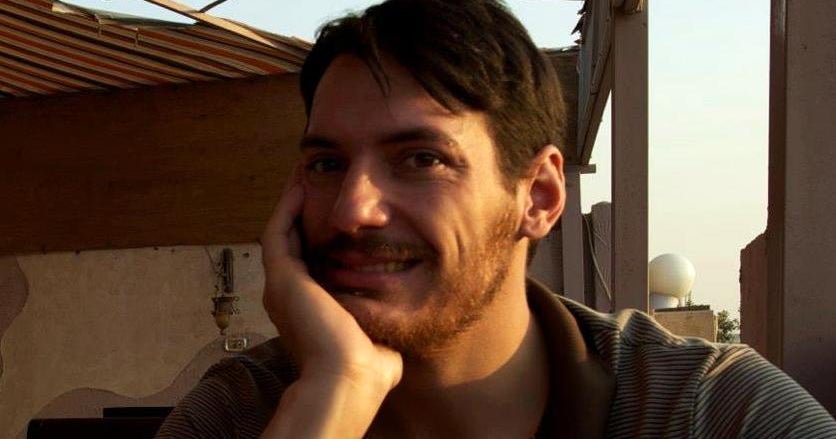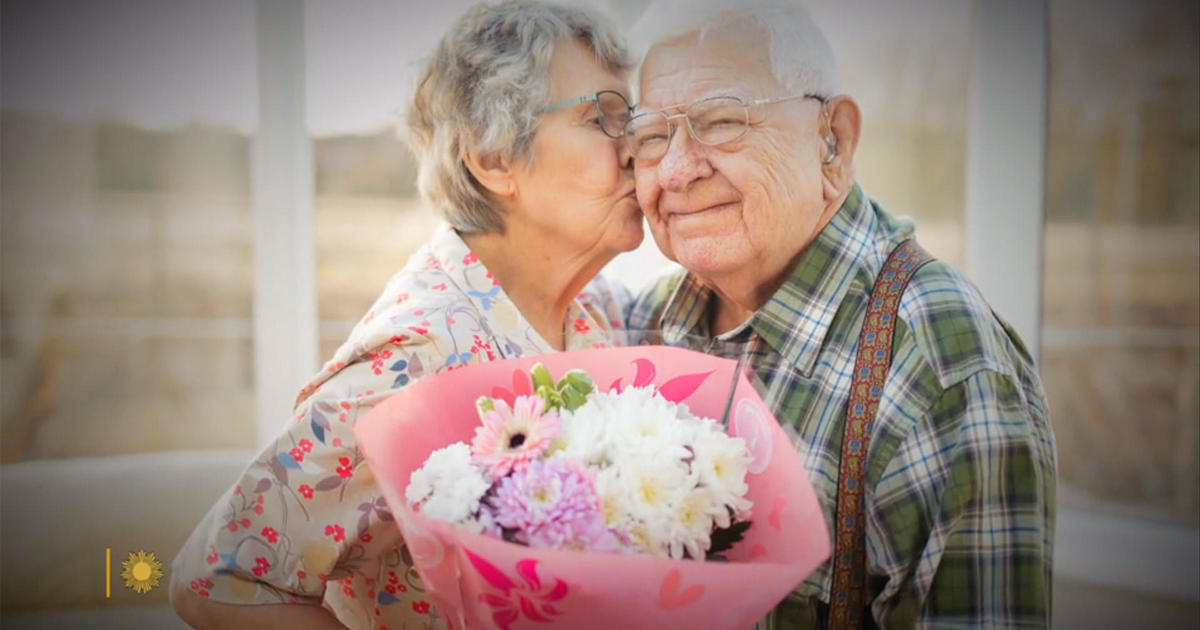CBS News
Experts weigh in on the psychology of romantic regret: “It sticks with people”

Strolling with her partner on the Brooklyn waterfront, writer Deborah Copaken looks happy in love. But she admits to a few romantic regrets along the way.
“I can’t imagine a single human being alive today, who has had at least one relationship, who doesn’t regret something.”
Now 57, Copaken says one of her big regrets goes back to when she was just 22.
“Back in 1989, I was in Jamaica, and I met a young man,” she recalls. “We’ll just call him ‘John Doe,’ how about that? Just to protect his identity. And after a week together, I felt like I had fallen in love with him.”
They briefly had to part ways — he, to London, to study theater, and she, to Afghanistan, to cover the war — but they soon reunited for `10 romantic days in England.
“I thought, ‘This guy’s it. I am in love. This is the relationship of my lifetime,'” says Copaken.
Alas, it was not to be.
“He said he was going to come visit me in Paris two weeks later,” she remembers. “And I knew his flight, and I knew when he was supposed to have arrived. And I was in my apartment, waiting around, and he never showed up.”
Back then, of course, there were no cellphones or internet.
“He had a very common name, like ‘John Doe,'” says Copaken. “And it’s not like you could find somebody back then with a common name, right? He’s gone. He’s gone.”
Copaken says she felt sad, confused and heartbroken over John Doe, and asks, “I mean, how would you react?”
Author Daniel Pink believes that romantic regret can last a lifetime.
“We see people in their 80s, in their 90s, with these romantic regrets. It sticks with people,”
he says.
Romantic regret — like all regret — is universal, according to Pink.
“Everybody has regrets,” Pink explains. “I mean, we have evidence from neuroscience, from social psychology, from cognitive science, that the only people who truly don’t have regrets are 5-year-olds. People with certain kinds of neurodegenerative diseases don’t have regrets. And sociopaths don’t have regrets. Everybody else has regrets.”
For his book on the subject, Pink collected more than 28,000 lovelorn regrets. The author reads several anecdotes from what he calls “the database of the regrets” — a vast inventory of unfulfilled love from 109 countries.
“‘Not asking out a high school friend on a date,'” Pink read from one submission. “He’s 53. That’s 35 years ago.”
Pink says the most common regret is not taking action. He shows another submission written by a 49-year-old man in Rhode Island, who aid, “I dated a girl in college, but hadn’t been experienced enough to know she was the one. I’ve never loved anyone as much as I loved her. I regret letting her go.”
Another 54-year-old man from Wisconsin simply wrote, “Not telling her I Loved her!”
Jackson Arn, The New Yorker’s art critic, thinks art is proof that romantic regret is universal.
“No matter what else the painting is about, no matter what else the work of art is about, you can almost hear it ‘humming’ underneath all the other melodies, so to speak,” Arn says in an interview held at the Metropolitan Museum of Art in New York City. He adds that the wistful humming can be heard all over the museum.
“Rodin had a Ph.D. in regret as far as I am concerned,” Arn says, and it’s not just Rodin. Examples through the ages are in museums all over the world.
“It could be Edvard Much, falling in an out of love with an older married woman, and being so heartbroken that he turned the experience into a whole series of paintings called ‘Love and Pain,'” he continued, also citing work by Edward Hopper and Kerry James Marshall, whose painting “Could This Be Love?” he hand-picked himself.
Arn sees a relationship between love, pain, regret and art.
“Love has always been a great cause of pain,” he says, “and art is sometimes the best therapy for it.”
For Copaken, the best therapy is what she recommends in her book: learn from regret. That’s what she did 21 years after her Paris heartbreak, when she finally tracked down the one that got away.
“I wrote an email, and I said, ‘Hey are you the same John Doe that stood me up in Paris?'” Copaken said. “And he wrote ack pages and pages, saying, ‘I did go to Paris. I arrived in Paris. I didn’t have the piece of paper with your phone number on it, I ended up staying at the youth hostel and I never found you again.”
Copaken and her old love reunited for lunch on a bench in Central Park. But, unlike the movies, they did not then ride off together into the sunset. Both were already married.
“It’s not that I wanted to marry him. It’s not that I wanted to blow up two families … that would have been terrible, right?” She says. “But it did make me understand what was lacking in my marriage. I realized at that moment that my marriage was faltering, and I needed to get out of it.”
This is what brings us back to that Brooklyn waterfront. Now divorced, Copaken is in love today with someone new — and happier, she says, because of her past regrets.
“You can choose to decide in your life whether regret is just going to stick on you like a cold, wet blanket, or whether you can use that regret as fuel,” she says. “If you use regret to make changes, positive changes in your life, then regret is the best fuel in the world.”
Produced by Amiel Weisfogel. Edited by Steven Tyler.
CBS News
Biden’s top hostage envoy Roger Carstens in Syria to ask for help in finding Austin Tice

Roger Carstens, the Biden administration’s top official for freeing Americans held overseas, on Friday arrived in Damascus, Syria, for a high-risk mission: making the first known face-to-face contact with the caretaker government and asking for help finding missing American journalist Austin Tice.
Tice was kidnapped in Syria 12 years ago during the civil war and brutal reign of now-deposed Syrian dictator Bashar al-Assad. For years, U.S. officials have said they do not know with certainty whether Tice is still alive, where he is being held or by whom.
The State Department’s top diplomat for the Middle East, Barbara Leaf, assistant secretary of state for Near Eastern Affairs, accompanied Carstens to Damascus as a gesture of broader outreach to Hay’at Tahrir al-Sham, known as HTS, the rebel group that recently overthrew Assad’s regime and is emerging as a leading power.
Near East Senior Adviser Daniel Rubinstein was also with the delegation. They are the first American diplomats to visit Damascus in over a decade, according to a State Department spokesperson.
They plan to meet with HTS representatives to discuss transition principles endorsed by the U.S. and regional partners in Aqaba, Jordan, the spokesperson said. Secretary of State Antony Blinken traveled to Aqaba last week to meet with Middle East leaders and discuss the situation in Syria.
While finding and freeing Tice and other American citizens who disappeared under the Assad regime is the ultimate goal, U.S. officials are downplaying expectations of a breakthrough on this trip. Multiple sources told CBS News that Carstens and Leaf’s intent is to convey U.S. interests to senior HTS leaders, and learn anything they can about Tice.
Rubinstein will lead the U.S. diplomacy in Syria, engaging directly with the Syrian people and key parties in Syria, the State Department spokesperson added.
Diplomatic outreach to HTS comes in a volatile, war-torn region at an uncertain moment. Two sources even compared the potential danger to the expeditionary diplomacy practiced by the late U.S. Ambassador Christopher Stevens, who led outreach to rebels in Benghazi, Libya, in 2012 and was killed in a terrorist attack on a U.S. diplomatic compound and intelligence post.
U.S. special operations forces known as JSOC provided security for the delegation as they traveled by vehicle across the Jordanian border and on the road to Damascus. The convoy was given assurances by HTS that it would be granted safe passage while in Syria, but there remains a threat of attacks by other terrorist groups, including ISIS.
CBS News withheld publication of this story for security concerns at the State Department’s request.
Sending high-level American diplomats to Damascus represents a significant step in reopening U.S.-Syria relations following the fall of the Assad regime less than two weeks ago. Operations at the U.S. embassy in Damascus have been suspended since 2012, shortly after the Assad regime brutally repressed an uprising that became a 14-year civil war and spawned 13 million Syrians to flee the country in one of the largest humanitarian disasters in the world.
The U.S. formally designated HTS, which had ties to al Qaeda, as a foreign terrorist organization in 2018. Its leader, Mohammed al Jolani, was designated as a terrorist by the US in 2013 and prior to that served time in a US prison in Iraq.
Since toppling Assad, HTS has publicly signaled interest in a new more moderate trajectory. Al Jolani even shed his nom de guerre and now uses his legal name, Ahmed al-Sharaa.
U.S. sanctions on HTS linked to those terrorist designations complicate outreach somewhat, but they haven’t prevented American officials from making direct contact with HTS at the direction of President Biden. Blinken recently confirmed that U.S. officials were in touch with HTS representatives prior to Carstens and Leaf’s visit.
“We’ve heard positive statements coming from Mr. Jolani, the leader of HTS,” Blinken told Bloomberg News on Thursday. “But what everyone is focused on is what’s actually happening on the ground, what are they doing? Are they working to build a transition in Syria that brings everyone in?”
In that same interview, Blinken also seemed to dangle the possibility that the U.S. could help lift sanctions on HTS and its leader imposed by the United Nations, if HTS builds what he called an inclusive nonsectarian government and eventually holds elections. The Biden administration is not expected to lift the U.S. terrorist designation before the end of the president’s term on January 20th.
Pentagon spokesperson Pat Ryder disclosed Thursday that the U.S. currently has approximately 2,000 US troops inside of Syria as part of the mission to defeat ISIS, a far higher number than the 900 troops the Biden administration had previously acknowledged. There are at least five U.S. military bases in the north and south of the country.
The Biden administration is concerned that thousands of ISIS prisoners held at a camp known as al-Hol could be freed. It is currently guarded by the Syrian Democratic forces, Kurdish allies of the U.S. who are wary of the newly-powerful HTS. The situation on the ground is rapidly changing since Russia and Iran withdrew military support from the Assad regime, which has reset the balance of power. Turkey, which has been a sometimes problematic U.S. ally, has been a conduit to HTS and is emerging as a power broker.
A high-risk mission like this is unusual for the typically risk averse Biden administration, which has exercised consistently restrained diplomacy. Blinken approved Carstens and Leaf’s trip and relevant congressional leaders were briefed on it days ago.
“I think it’s important to have direct communication, it’s important to speak as clearly as possible, to listen, to make sure that we understand as best we can where they’re going and where they want to go,” Blinken said Thursday.
At a news conference in Moscow Thursday, Russian President Vladimir Putin said he had not yet met with Assad, who fled to Russia when his regime fell earlier this month. Putin added that he would ask Assad about Austin Tice when they do meet.
Tice, a Marine Corps veteran, worked for multiple news organizations including CBS News.
CBS News
12/19: CBS Evening News – CBS News

Watch CBS News
Be the first to know
Get browser notifications for breaking news, live events, and exclusive reporting.
CBS News
Delivering Tomorrow: talabat’s Evolution in the Middle East

Watch CBS News
Be the first to know
Get browser notifications for breaking news, live events, and exclusive reporting.









